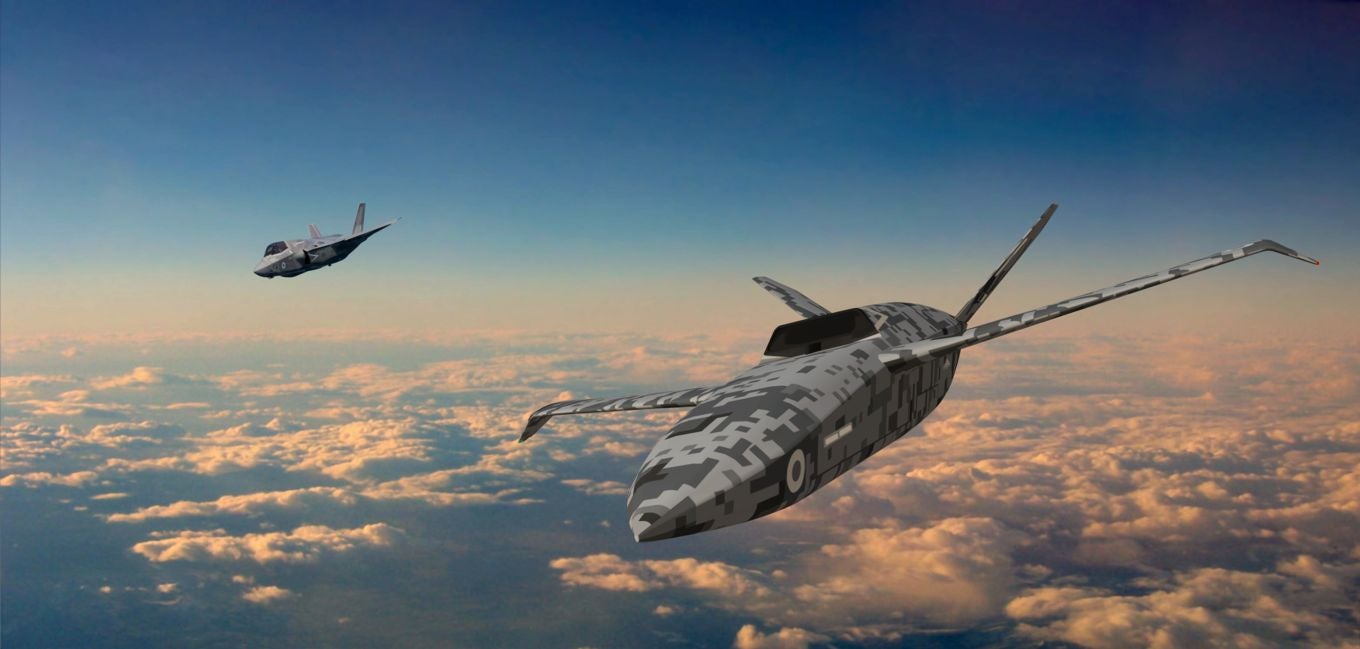
The UK Government has announced a further £30m investment into its programme to develop an uncrewed fighter aircraft that the armed forces hope will fly alongside the Eurofighter Typhoon and Lockheed Martin F-35 before the end of the decade.
Dubbed a ‘loyal wingman’, the system builds on the Royal Air Force’s (RAF) Lightweight Novel Combat Aircraft (LANCA) concept. The UK is aiming to have a full-scale vehicle flight test programme by the end of 2023.
The uncrewed fighter aircraft is designed to target and fire on adversary aircraft and ‘survive against surface to air missiles’.
The project is being developed by named Team Mosquito, which is led by Spirit AeroSystems and includes participation from Northrop Grumman UK.
Chief of the Air Staff Air Chief Marshal Mike Wigston said: “We’re taking a revolutionary approach, looking at a game-changing mix of swarming drones and uncrewed fighter aircraft like Mosquito, alongside piloted fighters like Tempest, that will transform the combat battlespace in a way not seen since the advent of the jet age.”
LANCA is led by the RAF Rapid Capabilities Office (RCO) and has its roots in a 2015 Defence Science and Technology Laboratory (Dstl) initiative exploring concepts for combat air technologies that offered reductions in cost and time. Dstl manages LANCA and Project Mosquito on behalf of the RCO.

US Tariffs are shifting - will you react or anticipate?
Don’t let policy changes catch you off guard. Stay proactive with real-time data and expert analysis.
By GlobalDataThe system is also being designed to fly alongside the in-development Tempest crewed fighter jet as part of a future combat air system or FCAS. The system is being designed so that it can be updated easily and affordably allowing it to maintain pace with new threats.
Defence Minister Jeremy Quin said: “This is a great win for the Northern Ireland defence industry and will showcase some of the most pioneering engineering work currently being undertaken in the UK.
“The £30m project will accelerate the development of the UK’s future air power by delivering cutting-edge uncrewed aircraft, maintaining our position as a world leader in emerging technologies.”
The Ministry of Defence (MOD) said the system would use ‘the latest software development techniques and civilian aerospace engineering and manufacturing expertise’ to deliver reductions in cost and development times, allowing the aircraft to reach the ‘frontline’ faster.
Director Future Combat Air Richard Berthon said: “Project Mosquito is a vital element of our approach to Future Combat Air, rapidly bringing to life design, build and test skills for next-generation combat air capabilities.
“Autonomous ‘loyal wingman’ aircraft create the opportunity to expand, diversify and rapidly upgrade Combat Air Forces in a cost-effective way, now and in the future.”
Traditional fighter jets like the F-35 cost around $100m per aircraft depending on the variant and are also costly to operate in terms of fuel costs. Systems like LANCA and other ‘loyal wingmen’ are designed to provide a cheap alternative that can operate in harm’s way.
Last November, Prime Minister Boris Johnson announced an increase in defence spending, with an extra £1.5bn injected into military research and development. The FCAS project is set to be a major beneficiary of this increase in funding.
Similar programmes are already underway in the US and Australia, with both aiming to develop ‘loyal wingman’ aircraft to augment their fighter jet fleets. In the US this is being developed under the ‘Skyborg’ programme. In Australia, its Airpower Teaming System (ATS) project aims to undertake flight tests in 2021.



